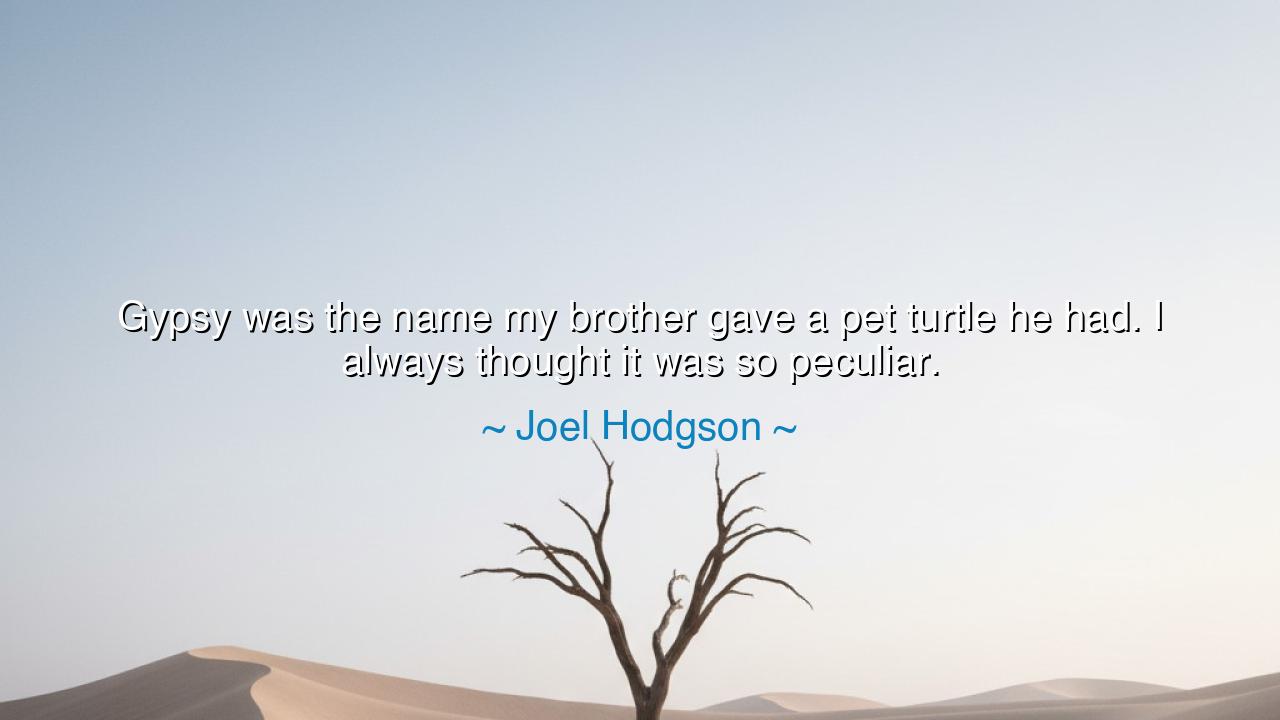
Gypsy was the name my brother gave a pet turtle he had. I always
Gypsy was the name my brother gave a pet turtle he had. I always thought it was so peculiar.






Hear the gentle and curious words of Joel Hodgson, who said: “Gypsy was the name my brother gave a pet turtle he had. I always thought it was so peculiar.” At first, this may seem but a small memory, a fragment of childhood recollection. Yet within it lies a reflection of the strange and wondrous ways in which human beings assign meaning, not only to the creatures of the earth but also to the stories they carry. For a name is never merely a label; it is a mirror of imagination, of identity, and of the mysteries of memory.
The pet turtle, slow and steady, is among the humblest of companions. It does not leap, nor bark, nor sing, but endures with quiet patience. To call such a creature Gypsy—a name evoking movement, wandering, and journeying—is indeed, as Hodgson says, “peculiar.” Yet herein lies the beauty of the tale: the contrast between the turtle’s stillness and the restless spirit of the name given to it. The brother’s choice reflects the human impulse to see in others, even in animals, the dreams we carry within ourselves.
The ancients, too, understood the power of naming. Among the Hebrews, to name a child was to declare their destiny; among the Greeks, heroes bore names that foretold their deeds. To name is to shape identity, to summon possibility from the unseen. When Hodgson’s brother named the turtle Gypsy, he unknowingly gave the creature a story beyond its shell—a story of wandering, of peculiarity, of imagination’s freedom. It mattered not that the turtle itself would never roam far; in the heart of a child, even the slowest of beings could carry the name of a traveler.
History offers us many examples of this peculiar pairing of names and natures. Consider Alexander the Great, whose horse was named Bucephalus, meaning “ox-head.” Though the horse was mighty and swift, its name seemed at first comical, even unfitting. Yet Bucephalus became a legend, remembered through the centuries, its name inseparable from its story. So too with Gypsy the turtle: though peculiar, the name gave the creature a place in memory, preserved forever in Hodgson’s words.
There is also a lesson here about the nature of peculiarity itself. What seems strange at first glance may, in time, become endearing, even profound. The child’s unusual choice of name may have caused Joel to pause, to wonder, to question. But is not life itself built upon peculiarities? The strangest of moments often remain the longest in our hearts. A peculiar name, a peculiar habit, a peculiar story—these are the treasures that separate the ordinary from the unforgettable.
Thus the teaching shines forth: do not dismiss the peculiar, for it is often the doorway to wonder. The names we give, the stories we tell, the meanings we attach—these shape the way we remember and the way we love. A turtle called Gypsy is not only a pet but a tale, a fragment of family lore, an echo of imagination that survives long after the creature itself has gone. Peculiarity is not folly, but the seed of memory.
The lesson, then, is this: cherish the peculiar in your own life and in the lives of others. When someone names a creature strangely, or sees the world differently, do not scoff but listen—listen for the imagination, the humor, the spirit within. For what is peculiar today may become precious tomorrow. In the end, as Hodgson shows, it is not the turtle alone that endures in memory, but the peculiar name it bore, which transformed a simple pet into a story worth retelling.
So let your action be this: honor the peculiarities around you. Let your imagination play in small things, and let the quirks of others be cherished rather than dismissed. For in these peculiarities lie the soul’s fingerprints, the marks of individuality and love. And perhaps, like Hodgson, you will one day look back and smile at the memory of a pet turtle named Gypsy, realizing that what seemed strange was in truth the magic of meaning at work.






AAdministratorAdministrator
Welcome, honored guests. Please leave a comment, we will respond soon